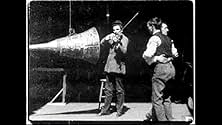This is a pretty interesting experiment to watch. It's the first ever, still existing attempt, to unite sight with sound. It features two men dancing to a violin player (possibly William K.L. Dickson himself), who is standing next to an Edison recording cylinder, that is capturing the sound.
The sound and images were not linked together as one yet. And it wasn't until recently that the sound and image have been added technically together. It's probably the reason why people hesitate to call this movie the first ever sound picture.
The movie is made by William K.L. Dickson, a assistant to Thomas Edison himself who ordered him to come up with a way to unite pictures and sound. The answer he provided was the Kinetophone, a Kinetoscope (basicly a large wooden box with a peephole in it, so people could watch the moving images) with a cylinder phonograph inside of it, for the sound. This is the first, that we know off, surviving movie-experiments that feature this technique. All of the later movies using this same technique were shot as silent movies and sound effects were recorded later and separately. So the Kinephone was not an attempt to synchronize sound and images but more an attempt to have images accompanied by sound. In some cases, people could even choose from three sound cylinders, featuring 3 different orchestral performances to accompany the images. Only 45 Kinetophones were ever made so you could hardly call the Kinephone a success. Also after this experiment, focus went off to other cinema techniques, mainly regarding movie-projectors.
So the experiment itself obviously did not become a success, also since it took over 30 more years before the first movies with sound were made and commercially released. They just couldn't yet technically synchronize and put the sound and the images together yet at the time and even if they could and techniques would had been available, it would had been a very expensive job to do so. It therefor really isn't the most influential or historically important movies out of cinematic history but it's very interesting to watch, how people constantly tried to improve the quality and techniques of early cinema and movie-making.
8/10
http://bobafett1138.blogspot.com/















